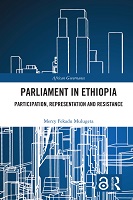Parliament in Ethiopia
Proposal review
Participation, Representation and Resistance
| dc.contributor.author | Mulugeta, Mercy Fekadu | |
| dc.date.accessioned | 2023-08-14T09:16:50Z | |
| dc.date.available | 2023-08-14T09:16:50Z | |
| dc.date.issued | 2024 | |
| dc.identifier | OCN: 1370487062 | |
| dc.identifier.uri | https://library.oapen.org/handle/20.500.12657/75348 | |
| dc.description.abstract | African legislatures remain understudied, yet democratisation, development and peacebuilding all depend on these key political institutions. This book provides an in-depth analysis of Ethiopia’s parliament, a country of key political and strategic importance to the whole region. In 1931, Ethiopia’s monarchical government introduced a system of parliamentary democracy with seemingly contradictory objectives; it wanted to legitimize its rule in a changing world, and also needed to provide a respectable retirement vocation (as senators and deputies) to sections of the aristocracy it ousted from power. This paradox of recognizing the parliament as essential to modern governance yet deliberately seeking weak institutions that are unable or unwilling to challenge those in power continues to haunt the parliament to this day. Ethiopia continues to struggle to maintain political stability, and the separation of power between government and parliament and a system of checks and balances are yet to substantially flourish. Drawing on extensive original data gathered from interviews and surveys, this book investigates the legal and practical status of federal representative institutions in Ethiopia from 1931 up to and including 2021. It delves into the rules and routines of parliament, its contextually and historically grounded culture of representation, and the techniques of manoeuvring executive bureaucracies. The book also aims to understand the extent of civil dis/engagement and the perceptions and role of citizens in shaping parliament, and how the mandates and functions of individual MPs are also determined by cultural and socio-economic factors such as gender, population, inequality and conflict. This book’s in-depth and original analysis will be of interest to researchers across African studies, politics, development, and governance. | en_US |
| dc.language | English | en_US |
| dc.relation.ispartofseries | African Governance | en_US |
| dc.subject.classification | thema EDItEUR::J Society and Social Sciences::JP Politics and government | en_US |
| dc.subject.other | Politics and government | en_US |
| dc.title | Parliament in Ethiopia | en_US |
| dc.title.alternative | Participation, Representation and Resistance | en_US |
| dc.type | book | |
| oapen.identifier.doi | 10.4324/9781003293163 | en_US |
| oapen.relation.isPublishedBy | 7b3c7b10-5b1e-40b3-860e-c6dd5197f0bb | en_US |
| oapen.relation.isFundedBy | b818ba9d-2dd9-4fd7-a364-7f305aef7ee9 | en_US |
| oapen.relation.isbn | 9781032275246 | en_US |
| oapen.relation.isbn | 9781003293163 | en_US |
| oapen.relation.isbn | 9781032275253 | en_US |
| oapen.collection | Knowledge Unlatched (KU) | en_US |
| oapen.imprint | Routledge | en_US |
| oapen.pages | 205 | en_US |
| peerreview.anonymity | Single-anonymised | |
| peerreview.id | bc80075c-96cc-4740-a9f3-a234bc2598f1 | |
| peerreview.open.review | No | |
| peerreview.publish.responsibility | Publisher | |
| peerreview.review.stage | Pre-publication | |
| peerreview.review.type | Proposal | |
| peerreview.reviewer.type | Internal editor | |
| peerreview.reviewer.type | External peer reviewer | |
| peerreview.title | Proposal review | |
| oapen.review.comments | Taylor & Francis open access titles are reviewed as a minimum at proposal stage by at least two external peer reviewers and an internal editor (additional reviews may be sought and additional content reviewed as required). |

